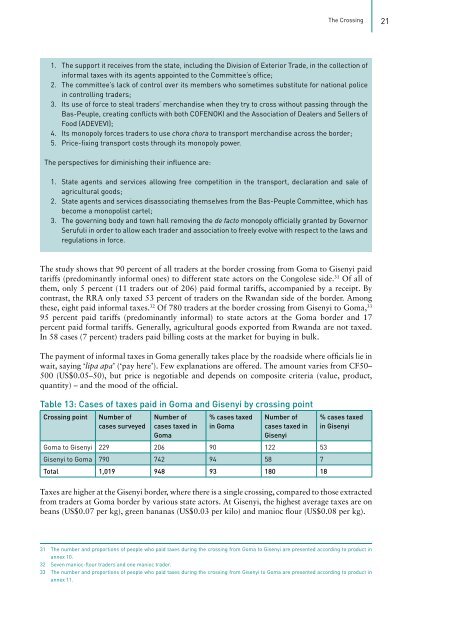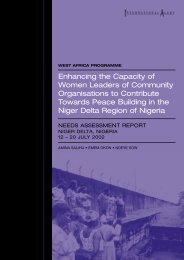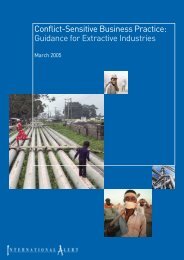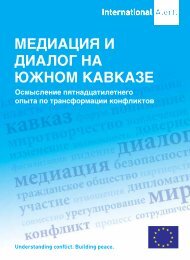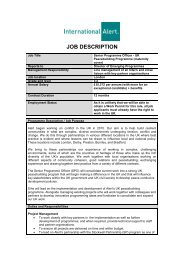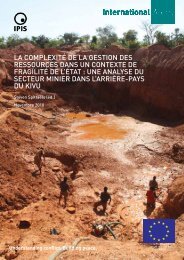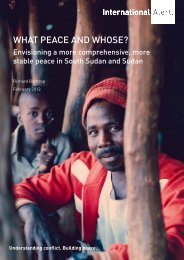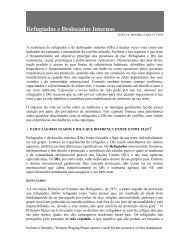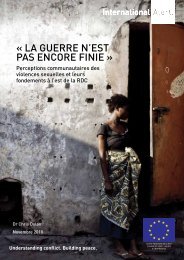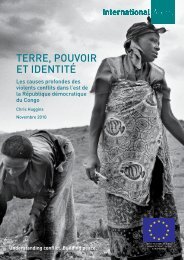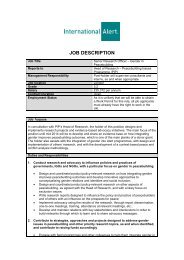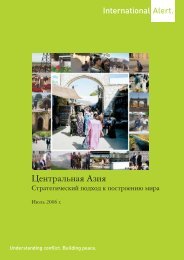The crossing English Version - International Alert
The crossing English Version - International Alert
The crossing English Version - International Alert
- No tags were found...
You also want an ePaper? Increase the reach of your titles
YUMPU automatically turns print PDFs into web optimized ePapers that Google loves.
<strong>The</strong> Crossing211. <strong>The</strong> support it receives from the state, including the Division of Exterior Trade, in the collection ofinformal taxes with its agents appointed to the Committee’s office;2. <strong>The</strong> committee’s lack of control over its members who sometimes substitute for national policein controlling traders;3. Its use of force to steal traders’ merchandise when they try to cross without passing through theBas-Peuple, creating conflicts with both COFENOKI and the Association of Dealers and Sellers ofFood (ADEVEVI);4. Its monopoly forces traders to use chora chora to transport merchandise across the border;5. Price-fixing transport costs through its monopoly power.<strong>The</strong> perspectives for diminishing their influence are:1. State agents and services allowing free competition in the transport, declaration and sale ofagricultural goods;2. State agents and services disassociating themselves from the Bas-Peuple Committee, which hasbecome a monopolist cartel;3. <strong>The</strong> governing body and town hall removing the de facto monopoly officially granted by GovernorSerufuli in order to allow each trader and association to freely evolve with respect to the laws andregulations in force.<strong>The</strong> study shows that 90 percent of all traders at the border <strong>crossing</strong> from Goma to Gisenyi paidtariffs (predominantly informal ones) to different state actors on the Congolese side. 31 Of all ofthem, only 5 percent (11 traders out of 206) paid formal tariffs, accompanied by a receipt. Bycontrast, the RRA only taxed 53 percent of traders on the Rwandan side of the border. Amongthese, eight paid informal taxes. 32 Of 780 traders at the border <strong>crossing</strong> from Gisenyi to Goma, 3395 percent paid tariffs (predominantly informal) to state actors at the Goma border and 17percent paid formal tariffs. Generally, agricultural goods exported from Rwanda are not taxed.In 58 cases (7 percent) traders paid billing costs at the market for buying in bulk.<strong>The</strong> payment of informal taxes in Goma generally takes place by the roadside where officials lie inwait, saying ‘lipa apa’ (‘pay here’). Few explanations are offered. <strong>The</strong> amount varies from CF50–500 (US$0.05–50), but price is negotiable and depends on composite criteria (value, product,quantity) – and the mood of the official.Table 13: Cases of taxes paid in Goma and Gisenyi by <strong>crossing</strong> pointCrossing pointNumber ofcases surveyedNumber ofcases taxed inGoma% cases taxedin GomaNumber ofcases taxed inGisenyiGoma to Gisenyi 229 206 90 122 53Gisenyi to Goma 790 742 94 58 7Total 1,019 948 93 180 18% cases taxedin GisenyiTaxes are higher at the Gisenyi border, where there is a single <strong>crossing</strong>, compared to those extractedfrom traders at Goma border by various state actors. At Gisenyi, the highest average taxes are onbeans (US$0.07 per kg), green bananas (US$0.03 per kilo) and manioc flour (US$0.08 per kg).31 <strong>The</strong> number and proportions of people who paid taxes during the <strong>crossing</strong> from Goma to Gisenyi are presented according to product inannex 10.32 Seven manioc-flour traders and one manioc trader.33 <strong>The</strong> number and proportions of people who paid taxes during the <strong>crossing</strong> from Gisenyi to Goma are presented according to product inannex 11.


